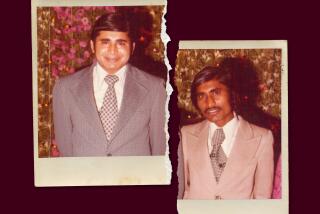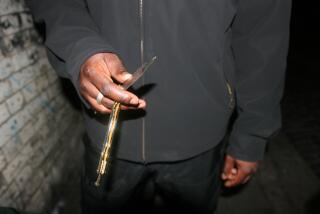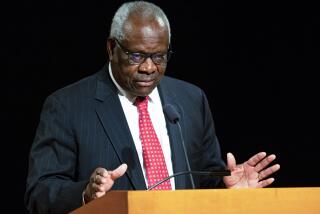2nd Conviction in Billionaire Boys Club Case Voided
- Share via
The conviction of a second member of the Billionaire Boys Club was overturned Wednesday by a federal judge because the jury’s exposure to a tape recording was considered prejudicial to the case.
U.S. District Judge Saundra Brown Armstrong concluded that she was required to reverse Arben Dosti’s conviction and life sentence as a result of a federal appeals court decision two months ago that overturned the conviction of Dosti’s co-defendant, Reza Eslaminia.
In February, the 9th Circuit Court of Appeals ruled in a 3-0 vote that the jury’s exposure to a police interview with Eslaminia’s brother contained statements that were “very prejudicial,” that “seriously undermined” the defense and that may have led to the guilty verdict.
Eslaminia and Dosti, who were tried together, were convicted 10 years ago of kidnapping and murdering Eslaminia’s wealthy Iranian father in the summer of 1984. Both defendants were sentenced to life imprisonment without the possibility of parole.
San Francisco attorney Dennis Riordan, who handled Dosti’s appeal, argued that the tape recording also affected his client’s case. The tape, Riordan said, impeached several defense witnesses and bolstered the credibility of a crucial witness against both men.
“This tape, on a number of critical points, impacts both Dosti and Eslaminia,” Riordan said. “In some cases it had an even greater impact on Dosti.”
California Deputy Atty. Gen. John Deist disagreed, contending that the tape recording “gave a unique perspective of Eslaminia’s defense. Dosti’s defense was entirely different.”
Eslaminia was released on bail after the February ruling and is scheduled to be retried in San Mateo County in October.
Riordan said he expects that Dosti, 36, also will be released on bail and that prosecutors will again try the two men together.
Deist said the state has not yet decided whether to appeal the court’s ruling.
At the trial, the prosecution introduced as evidence a tape recording of a police interview with Eslaminia, which the jury listened to during deliberations. Then the jury--inadvertently--listened to the reverse side of the tape, which contained comments by Eslaminia’s brother, Ali Eslaminia, that had not been introduced as evidence.
The appeals court ruled that some of the comments impugned the character and credibility of an important defense witness, which “may very well have caused the jury to doubt important elements of testimony helpful to the defense. . . .”
“Much of the damage to the defense might have been mitigated had there been an opportunity to cross-examine Ali at trial,” the appeals court said. “Instead, Ali was effectively allowed to ‘testify’ in a completely unfiltered fashion, without the presence of a judge or counsel.”
Because the credibility of witnesses was the key issue in the trial, the tape recording was prejudicial, the appeals court concluded.
Earlier this month, the state Supreme Court rejected an appeal by Joe Hunt, the founder of the Billionaire Boys Club, who was convicted in 1987 of murdering a man whose body has never been found.
Hunt was 23 in 1983 when he founded the investment and social club of young men from prominent Southern California families. The members were enthralled by fast cars, designer clothes, trendy nightclubs and get-rich-quick schemes.
By 1984, however, the group’s financial schemes were in disarray.
Prosecutors argued that Hunt killed a man who duped him in a commodities swindle. Hunt also was accused of murdering Eslaminia’s father, Hedayat Eslaminia, a businessman who had been a high-ranking official in the government of the shah of Iran.
Hedayat Eslaminia was slain in 1984 in what prosecutors said was an extortion plot to salvage the club’s foundering financial fortunes. Hunt’s conviction in that case was overturned on appeal, and the charge against him was dropped after a jury deadlocked at a retrial.
Times wire services contributed to this story.
More to Read
Sign up for Essential California
The most important California stories and recommendations in your inbox every morning.
You may occasionally receive promotional content from the Los Angeles Times.










